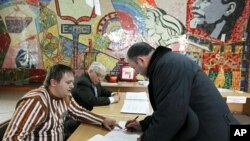Russia’s ruling party has won Sunday's regional elections, but with less than half of votes cast.
Voting from the Baltic to the Arctic, millions of Russians cast ballots in regional elections Sunday. The voting was seen as the kick-off for a political year - parliamentary elections in December and presidential elections next March.
Heavy government support backed the official ruling party, United Russia. About 4,000 opposition candidates were disqualified. Opposition posters were torn down from billboards. Opposition access to TV and radio was highly restricted.
On voting day, the United Russia machine focused on getting a massive turnout from voters who heavily depend on the goodwill of government officials - soldiers, students living in state university dormitories and elderly people living in nursing homes.
Grigory Melkonyants runs Golos, Russia’s only independent election watchdog group. He says many of his 400 election observers decided not to go to polling stations after they received calls or visits from the police.
While he says the election environment in Russia gets worse and worse with each election, voters are increasingly willing to use the Internet or his toll-free number to call in complaints, more than 700 so far.
Despite the pressure, and the official support, United Russia received only 46 percent of the vote. With the opposition vote split among three other parties, Russia’s ruling party won 68 percent of seats in ruling legislatures.
Victor Linnik, editor of Slovo, a political magazine, said, "Overall results by the United Russia can be considered a modest win."
The communists came in second, winning 13 percent of the seats. Gennady Zyuganov, leader of the Communist Party, said,"The ruling party has again demonstrated all the dirt and disgusting things that the voters don’t accept."
That criticism was not aired on state television.
Last month, Finance Minister Minister Aleksei Kudrin made waves by saying Russia needs "fair and honest" elections to support its economic recovery.
On Monday, Russia's Prime Minister Vladimir Putin took a low political profile, choosing to go to television for a briefing on the nuclear emergency in Japan.
Off-camera, he praised the election results in an interview with Interfax news agency, saying United Russia "has won in all regions where elections were held." He said, "It is the leading political force."
Mr. Putin said the vote is an indicator of people’s confidence in the authorities in general in a crisis.
Linnik, the political analyst, predicted. "In Duma elections for December of this year, we will pretty much see a repeat of the same showing, for United Russia and other parties," he said.
Russia is the world’s largest oil producer, and oil prices are on Mr. Putin’s side.
With the turmoil in the Arab world and the loss of nuclear power plants in Japan, the price of Russian oil is 50 percent higher than last year. That means more money for Prime Minister Putin to raise pensions and state salaries in the run-up to elections that are to decide Russia’s future for much of this decade.
Russian Ruling Party Wins Regional Vote
- By James Brooke




